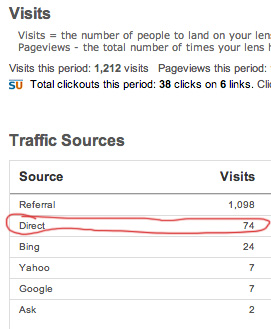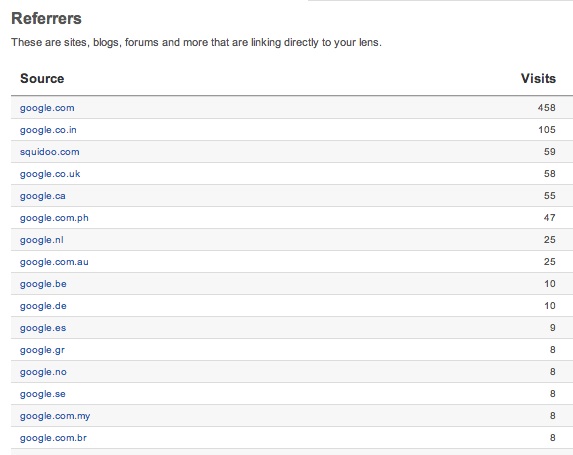I’ve got the Google Traffic blues.
Smart online writers depend on the search queries in our traffic stats to show us what our readers are looking for, want to know, or might want to read more about. This helps us improve our existing content, by tailoring it to our readers’ needs. Search traffic records also help us look for leads about new topics to write on which might get traffic.
Over time, observing search traffic can give you instincts about what kinds of things people tend to search for on the web, and what they don’t. This is very useful knowledge for an online writer to have.
There’s just one problem.
Google is hiding more and more of this information. As a result, traffic stats on sites like Squidoo are starting to look weird:
“Direct” traffic? Just what does that mean, anyway?
Originally, “Direct” traffic indicated visitors navigating to our websites via a bookmark, clicking on a link in a private email, typing the URL in directly, or some other source that provided absolutely no information that our traffic software could track.
To this we may now add Google search queries on iOS6. Google doesn’t usually hide search data this completely, but in some cases, it’s encrypting/concealing search data so much that when a user performs a Google search and arrives on your site, Google won’t even let your traffic software know, “Hey, that visitor came from us.” It’s as if Google were walking behind the visitor with a broom, sweeping away their footprints.
So that’s why our traffic stats now show so much so-called “Direct” traffic. It’s search traffic arriving under Google’s invisibility cloak.
But all the rest of Google’s search traffic is filed under “Google,” right? And then the search queries should show up under the “Keywords” chart?
Sadly, no. In many cases, Google is only telling Squidoo, “Hi, I just sent you a visitor,” without passing along the actual terms/keywords they searched for. So many Google search traffic visits are now filed under the “Referrers” chart, instead of the “Keywords” chart:
If you check Google Analytics, the keywords for these searches are all listed as “Not Provided.”
Unfortunately, since Google is blocking the data from its end, there is absolutely no way to ferret out what words those visitors searched for to find your page.
Not all Google search queries are hidden. In some cases, they still show up under “Keywords.” But more and more of them are not showing up. This has been going on for a while, but it’s getting worse.
In 2011, Google started encrypting (hiding) search data for users logged into Google or Google Plus. At the time, Matt Cutts of Google claimed that this “not provided” data would be a very low percentage of our traffic stats data, “in the single digits.” That was an underestimate, of course.
More recently, Firefox has started voluntarily encrypting searches from users using Google search at the top of its browser. More and more web applications are following suit.
Since more and more third-party browsers and apps are voluntarily using Google encryption when their users do a Google search, the percentage of search terms “not provided” by Google keeps growing. Some websites are reporting as much as 50% of their search traffic is concealed by the “not provided” filter.
Google claimed that blocking search data was done to protect visitor privacy, but it’s a pile of crock. Google advertisers get access to search query data which is “not provided” to the rest of us. Basically, you have to pay Google now to get complete data on what your customers are looking for. If you’re doing it as a commercial advertiser, you get to snoop on people’s web searching habits; if you’re doing it as a writer trying to learn what your readers want, tough.
Luckily, we’re not entirely dependent on Google to help us learn what our visitors want. Bing, Yahoo, and other search engines are still reporting their search data to Squidoo, so we’ll still see plenty of examples of what kinds of searches are bringing visitors to our pages under the “Keywords” column. But we’re missing a complete picture. We may not be seeing the most popular searches bringing visitors to our pages, or, at the least, only a fraction of those searches are turning up in our “Keywords” column, with the rest hidden.



Thanks for explaining this. I was wondering what was going on.
It’s all tied together in Google’s plan to wall off the web. First they encourage everyone to stay logged into Google+, which is . . . Google. Then they serve all their results both from the search engine and G+ via https, which is secure socket, supposedly for privacy, but that also keeps people like us from data harvesting things like keyphrases. I can’t even get the keyphrases in AWStats for my own website anymore, at least not from Google! They’ve come a long way from their “Don’t be evil.” days . . .
You’re right: all the big companies seem to be embracing the “walled garden for stuff that should be public, no walls/no privacy for stuff that should be private” approach.
St. Tim Berners-Lee, saaaaaave us!
I hate it. One of my top-ranking lenses never would have been written were it not for all the traffic stats containing the phrase “youth choir” that I was seeing on another lens.
Well at least that clears up a mystery for me as to why my squidoo traffic mostly seems to be coming from ‘referrals’. G is really push the envelope as far as I’m concerned. When a competitor comes out with a search product that can compete I see people abandoning google in droves.
I hope you’re right! Unfortunately, while this “not provided” mess really makes things difficult for us as writers trying to learn what our readers are looking for, Google’s primary users are not us, but people searching the web.
They don’t care if we can’t see what search queries they use. All they want is to be able to Google something, and find a result that matches their query. As long as Google’s doing that, then Google’s main customer base is satisfied. (In fact, Google users don’t even care if it’s the best result, as long as the result adequately satisfies their query.)
I’m afraid that Google can get away with a lot of shenanigans that bother us as web content makers, as long as web content consumers are happy.
Seeing exactly the same on my lenses too. The only good thing is that most of the Referral traffic is still showing it comes from Google. The interesting thing is just how many countries this comes from, and I know that traffic from Asia etc is unlikely to make me a sale, whereas traffic from the USA or UK could.